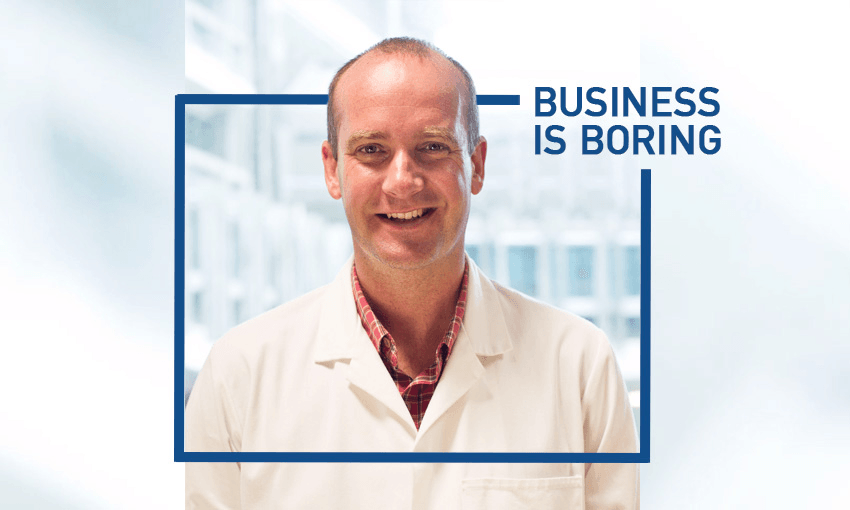Business is Boring is a weekly podcast series presented by The Spinoff in association with Callaghan Innovation. Host Simon Pound speaks with innovators and commentators focused on the future of New Zealand, with the interview available as both audio and a transcribed excerpt. This week he talks to HoneyLab co-founder Dr Shaun Holt, creator of Honevo.
New Zealand honey is some pretty wondrous stuff. Many will be familiar with manuka honey, but it doesn’t stop there. Today’s interview is with a serial entrepreneur who used his medical and research background to create a clinically proven kānuka honey product. When you hear that a product is all natural but as effective as a synthesised pharmaceutical product, you might find your scepticism rising. So today’s guest went out and created a groundbreaking study, recently reported in the British Medical Journal Open, to prove his product’s case.
Utilising a network of pharmacies, Dr Shaun Holt got his Honevo cold sore gel, made from 90% kānuka honey, into the hands of hundreds of cold sore sufferers. In a huge trial, they proved that their product was as effective as the market leader incumbent, and tasted a lot nicer too.
Holt is a trained pharmacist, doctor, successful author and serial entrepreneur. He started and exited a clinical research company and research overview service before setting his sights on the pharmaceutical industry, where the spoils are large but the cost of entry can be mindboggling. To talk the journey, the many steps leading to today, and what’s next, Dr Shaun Holt of HoneyLab joined the podcast.
Either download this episode (right click and save), have a listen below or via Spotify, subscribe through iTunes (RSS feed) or read on for a transcribed excerpt.
‘Natural’ has become such a cipher of a word. Arsenic is natural, but that doesn’t mean you want to be chucking it into everything! So tell us about your journey to becoming interested in helping people understand natural products.
Well I wasn’t interested in the slightest to be honest, like a lot of doctors. They’re still very sceptical of the whole thing. But for the research review company, one of them was a natural health researcher, so I started reading all the journals and summarising [them and] I found there was a lot of nonsense out there, but there was also some really good stuff hidden in there. Ginger, for example, we think is an old wives’ tale. But there’s a great study in America with 600 people with chemotherapy nausea and [it found] it was as good as the drugs if you gave the correct dose. So hidden gems like that.
After writing that for a couple years, I thought these publications would make a pretty nice book. So I put that out there, got a publisher, and it was a bestseller. So I’m really proud of that book.
What are some others? Ginger is a well known one. Was honey involved in that? Was that part of your path in being interested in local honey?
Yep, honey was there. Also St John’s Wort for depression. Fish oil for reducing cholesterol and blood pressure. Non-pharmacological things like meditation, yoga, and cannabis, which is topical now. Probably around only 5% of these natural therapies have good evidence that they work, so 95% of them don’t. But when you think that there are hundreds of these things, 5% is actually quite a few.
And when so much media coverage can be based on some pretty dubious stuff, it’s very important to be able to take a scientific view on it.
I’ve become known to the media as the go-to person to comment on these things. I’m particularly known for criticising things like homoeopathy which is, of course, ridiculous, and bleach solutions to cure your cancer. I’m known as a sceptic who pulls no punches on these ridiculous and potentially dangerous things, but at the same time, promoting ones we should be using more. I don’t fit into either camp. A lot of scientists think the whole natural thing is crazy. A lot of the natural people hate all the medicines. I just sit in the middle. This works, this doesn’t. How do you decide? You look at the science. It’s really obvious to me.


